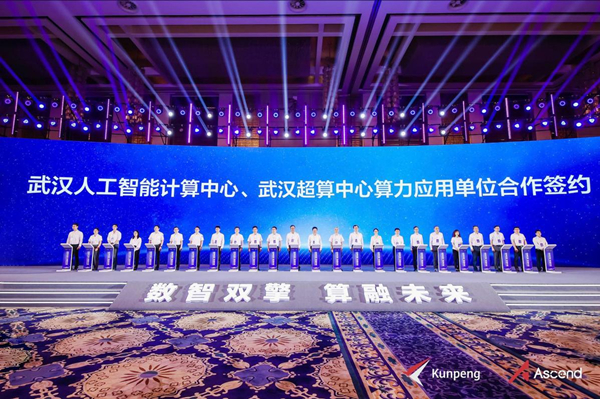Conference on computing, big data held in Wuhan


The Wuhan Artificial Intelligence Computing Center and the Wuhan Supercomputing Center sign cooperation agreements with 23 computing power application cooperation institutes at the 2023 East Lake Computing Power and Big Data Innovation Conference. [Photo provided to chinaopticsvalley.com]
The 2023 East Lake Computing Power and Big Data Innovation Conference was held in Wuhan, capital of Central China's Hubei province, on Aug 11.
Academic experts, entrepreneurs, and representatives of industry organizations attended the conference to discuss promoting the high-quality development of the digital economy through computing power development.
The conference explained and elaborated on the "Three-Year Action Plan for the Computing Power and Big Data Industry Chain in Hubei Province (2023-2025)."
Hubei will implement seven special measures, including infrastructure upgrading, industrial chain strengthening and extension, application scenario promotion, future industry nurturing, market entity cultivation, and enhanced digital security.
By 2025, the overall scale of the computing power and big data industry is expected to exceed 150 billion yuan ($20.69 billion), making Hubei the central hub of the national computing power network and the core area for innovation and development in computing power and big data nationwide.
During the conference, the Wuhan Artificial Intelligence Computing Center was officially unveiled as a national-level platform for new generation artificial intelligence public computing power in order to promote open innovation.
Relying on the center, the Institute of Automation of the Chinese Academy of Sciences, in collaboration with the Wuhan Artificial Intelligence Research Institute, has already launched the world's first omni-perception pre-trainer – "Zidong Taichu".
At the conference, "Zidong Taichu 2.0" was released. This supports full cross-modal understanding, generation, and correlation, achieving a leap from perception and cognition to decision-making.
Hubei, the geographical and networking center for the growth of "Digital China", has been developing itself into a national hub for digital economic development and promoting the establishment of national computing power hub nodes in recent years.
So far, the province has built computing power clusters including the Wuhan Artificial Intelligence Computing Center and the Wuhan Supercomputing Center. It has also installed 103,000 5G base stations, and achieved extensive 5G network coverage in urban areas.







